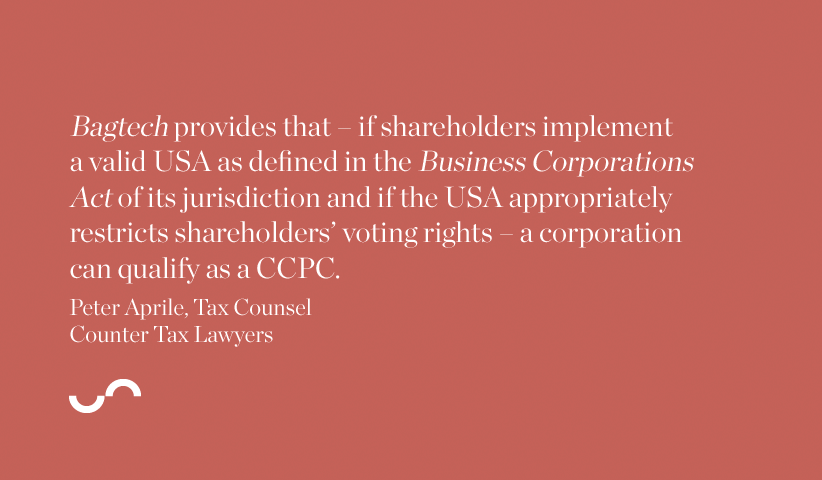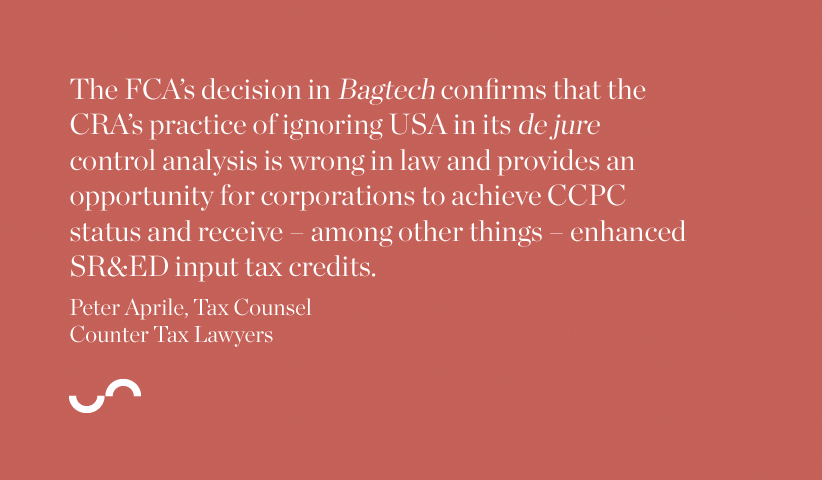
The Income Tax Act (“ITA”) provides various tax advantages to corporations that qualify as Canadian-Controlled Private Corporations (“CCPC”).
Subsection 125(7) of the ITA provides that a corporation will be a CCPC if it is not controlled by public corporations or non-residents. The case law reveals two types of control: (1) de jure control (control in law); and (2) de facto control (control in fact). De jure control is the right of control that is based on the ownership of the majority voting shares in the election of the Board of Directors. In addition, the de jure control analysis must take into account paragraph 125(7)(b) which provides that all non-resident and publicly owned voting shares are deemed to be owned by a single person (the “Hypothetical Shareholder”). If the Hypothetical Shareholder owns more than 50% of a corporation’s voting shares, it is not a CCPC.
CCPC tax advantages include the ability to receive enhanced scientific research and experimental development (“SR&ED”) input tax credits. CCPCs are eligible to receive refundable tax credits equal to 35% of their SR&ED expenditures. If the CCPC’s tax credit exceeds its tax payable for the year, the CCPC will receive a refund. Unfortunately, non-CCPCs are not entitled to these enhanced SR&ED input tax credits. Instead, these corporations are eligible to receive a tax credit equal to 15% of their SR&ED expenditures. Moreover, these tax credits are not refundable and, therefore, if the tax credit exceeds the tax payable for the year, the tax credit is wasted.

In the past, the CRA’s de jure control analysis held that the existence of a unanimous shareholders’ agreement (“USA”) does not impact the Hypothetical Shareholder on the basis that the Hypothetical Shareholder is not a party to the USA. However, Federal Court of Appeal (“FCA”) decision in The Queen v. Bioartificial Gel Technologies (Bagtech) Inc. (2013 FCA 164) presents an opportunity for corporations to qualify as CCPCs notwithstanding that public corporations or non-residents own more than 50% of voting shares.
In Bagtech, non-residents owned more than 60% of Bagtech’s voting shares. However, Bagtech’s shareholders had executed an USA that, among other things, gave Bagtech’s Canadian shareholders the power to elect the majority of Bagtech’s directors. In the Tax Court of Canada, Bagtech successfully argued that the Canadian shareholders’ right to elect the majority of directors had the effect of giving the Canadian shareholders de jurecontrol. The FCA dismissed the government’s appeal, thereby confirming that the CRA must consider the rights and restrictions under an USA when determining a corporation’s CCPC status.
It is important to note that, in Bagtech, the Canadian shareholders’ right to elect the majority of Bagtech’s directors – and the corresponding limitation on the voting shares held by non-residents – was in the USA. If the right to elect the majority of Bagtech’s directors had been part of some other agreement or document, the FCA, citing the Supreme Court of Canada’s decision in Duha Printers (Western) Ltd. v. Canada ([1998] 1 SCR 795), would have decided Bagtech in the government’s favour on the basis that only constating documents have the power to limit shareholders’ ability to elect directors.

Bagtech provides that – if shareholders implement a valid USA as defined in the Business Corporations Act of its jurisdiction and if the USA appropriately restricts shareholders’ voting rights – a corporation can qualify as a CCPC. However, a corporation that adopts this approach must continue to ensure that a non-resident or public corporation, either alone or with related non-residents or public corporations, does not exercise de facto control. For example, de facto control would include circumstances where a CCPC is financially dependent, significantly indebted, or reliant on the unique expertise of a non-resident or public corporation.
The FCA’s decision in Bagtech confirms that the CRA’s practice of ignoring USA in its de jure control analysis is wrong in law and provides an opportunity for corporations to achieve CCPC status and receive – among other things – enhanced SR&ED input tax credits.

.jpg?width=120&name=Counter%20Tax%20Litigators%20Logo%20Stacked%20(MidnightBlue%20on%20White).jpg)




.png?width=499&height=299&name=CRA%20Disputes_Management_Board_First_Conversation%20(Sphere%201%20Purple).png)


.png?width=400&height=400&name=CT-How_Can_We_Help-22_july_NewGraphic_b(small).png)